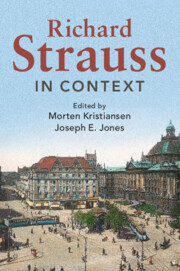Book contents
- Richard Strauss in Context
- Composers in Context
- Richard Strauss in Context
- Copyright page
- Contents
- Figures
- Notes on Contributors
- Preface
- Note on Translation
- Part I Family, Friends, and Collaborators
- Part II Career Stations
- Part III Cultural Engagement and Musical Life
- Chapter 14 Strauss as Reader
- Chapter 15 Antiquity
- Chapter 16 Philosophy and Religion
- Chapter 17 The Allgemeine Deutsche Musikverein
- Chapter 18 The Genossenschaft Deutscher Tonsetzer
- Part IV Professional and Musical Contexts
- Part V In History
- Part VI Artifacts and Legacy
- Further Reading
- Appendix: Letters Bibliography
- Index
Chapter 16 - Philosophy and Religion
from Part III - Cultural Engagement and Musical Life
Published online by Cambridge University Press: 08 October 2020
- Richard Strauss in Context
- Composers in Context
- Richard Strauss in Context
- Copyright page
- Contents
- Figures
- Notes on Contributors
- Preface
- Note on Translation
- Part I Family, Friends, and Collaborators
- Part II Career Stations
- Part III Cultural Engagement and Musical Life
- Chapter 14 Strauss as Reader
- Chapter 15 Antiquity
- Chapter 16 Philosophy and Religion
- Chapter 17 The Allgemeine Deutsche Musikverein
- Chapter 18 The Genossenschaft Deutscher Tonsetzer
- Part IV Professional and Musical Contexts
- Part V In History
- Part VI Artifacts and Legacy
- Further Reading
- Appendix: Letters Bibliography
- Index
Summary
This chapter surveys the wide range of spiritual and philosophical ideas that influenced Strauss during the emergence of his famously idiosyncratic worldview. Already a “freethinker” in his youth, and a product of an “alt-katholisch” household that rejected central Catholic doctrine, Strauss settled into a comfortable atheism while still in his teens. This skeptical disposition provided the backdrop for his encounters with 1) the fundamentalist Wagnerian metaphysics of his mentor, Alexander Ritter, and Wagner’s powerful and cultured widow Cosima; 2) Arthur Schopenhauer’s The World as Will and Representation (1818, 1844), which he studied carefully on his own; 3) the later, anti-Wagnerian writings of Nietzsche (most famously Also sprach Zarathustra), which had a powerful effect on Strauss’s tone poems beginning with Till Eulenspiegels lustige Streiche (1895); and 4) the artistic and intellectual legacy of Johann Wolfgang von Goethe, his lodestar, whose devotion to classical culture, and break from Romanticism, were paralleled by Strauss’s own.
- Type
- Chapter
- Information
- Richard Strauss in Context , pp. 145 - 152Publisher: Cambridge University PressPrint publication year: 2020

